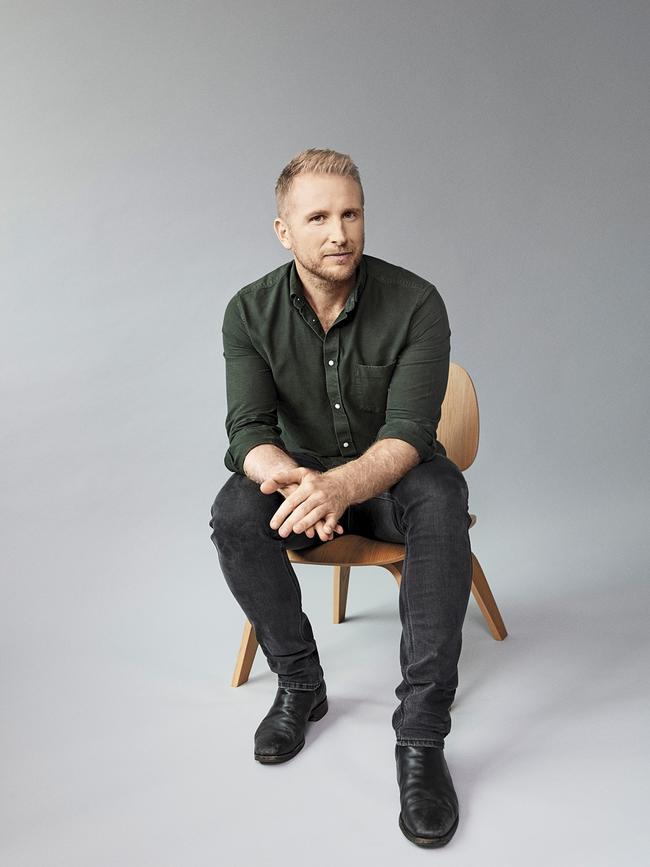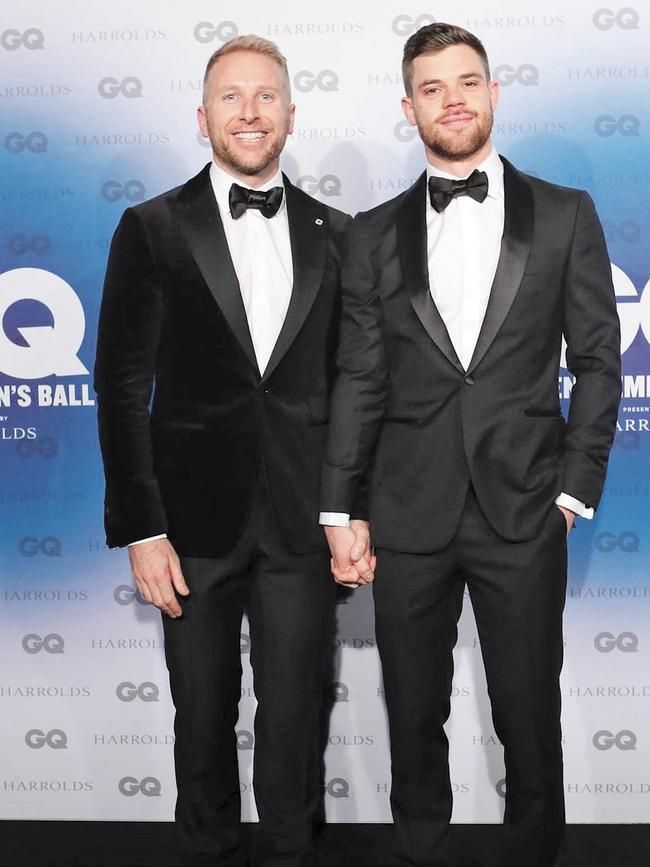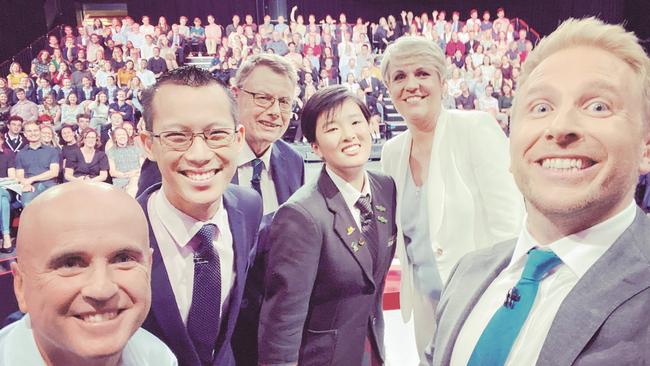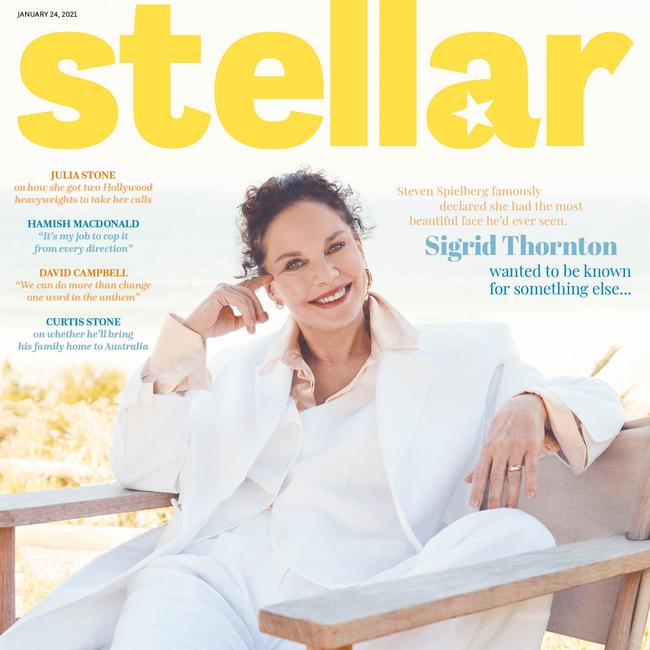Q+A host Hamish Macdonald says political abuse saw him leave social media
The journalist and Q+A host reflects on the personal toll of his public position and reveals why abuse from all sides of politics has seen him give up social media.
Stellar
Don't miss out on the headlines from Stellar. Followed categories will be added to My News.
He has grown a beard and has a tan. In other words, Hamish Macdonald looks like a man who has just returned from summer holidays.
Which, indeed, he has – over the past few weeks, Macdonald has spent his time bushwalking, having beers with friends and swimming in the lake near his father’s home in the resort village of Jindabyne in the NSW Snowy Mountains.
He had planned to do the same last year, right before taking the reins as host of ABC mainstay Monday night panel show Q+A.
But then the catastrophic bushfires erupted, which not only forced him to cut short his getaway but also, ironically, to plan another one, right to the frontline of the flames, where he started that new job a few weeks early in order to cover the unfolding disaster.

Macdonald’s partner, economist Jake Fitzroy, even had to step in as his producer for a few days until an ABC News team could get there.
This time around, the only thing that cut short his holiday was a return home to Sydney, where he will host the Australian of the Year Awards tomorrow. “Our holiday was nothing extravagant,” Macdonald tells Stellar. “It was just a chance to take a breath after a very big year.”
And what a year it turned out to be. While Macdonald knew he would be under scrutiny when he succeeded Tony Jones as host of Q+A, he couldn’t anticipate that he would take over during a chaotic and era-defining year, when it became more important than ever to ask and get answers to the big questions.
Bushfires, a global pandemic, economic collapse, racial protests erupting across the globe, a polarised US presidential election and Australia’s fracturing relationship with China – all of it conspired for a first 12 months on the job like no other.
“Never would I have imagined that we’d end up spending the bulk of the year doing a live studio show without a live studio audience,” he tells Stellar.

“Never would I have imagined that we’d do shows with a panel entirely on remote. Never would I have imagined that we’d get the Chinese government to come on the program and face questions from the Australian public with no limits.
“Never would I have imagined that we’d do all of that and come out the end of the year with audience growth.”
The scope of everything that unfolded in 2020 – to say nothing of the intense emotions its unceasing news cycle elicited – eventually prompted Macdonald to make a decision. Many media personalities use platforms like Twitter and Instagram to engage with their audiences, share and follow news and ultimately buff their public profiles.
However, in the middle of the year, Macdonald opted out altogether. He had come to realise that in his new role it was now a hindrance and a distraction.
“I work on a show where you’re bringing together different opinions and viewpoints, and ultimately my job as a journalist is to test those opinions no matter what they are,” the 39-year-old tells Stellar.
“If you’re someone who sits in the middle of those exchanges in your day job, you end up copping it from every direction. I’ve never had more abuse for the interviews I’ve conducted than I had last year.

“And the abuse has come from left-wing people who don’t like you asking difficult questions of Dan Andrews, and it’s come from people on the right who don’t like you asking difficult questions of the federal government. I’ve definitely learnt you can’t please everyone.
“I know these are complicated times, and people’s anxieties are heightened. Sometimes, if someone doesn’t like the information you’re delivering to them, they will take it out on you. I understand why that happens, but you wouldn’t be human if it didn’t hit you pretty hard.”
Macdonald – the second youngest of four children, all of whom have worked in journalism at some point in their careers – describes himself as “reserved. I don’t tend towards talking about stuff in my life that much. I’m sure my colleagues would tell you that and they probably find it very frustrating at times.”
But he’s open enough to credit his relationship with Fitzroy for helping him navigate the past 12 months.
“I wouldn’t have been able to get through some of its challenges without him. He’s someone who’s loving and supportive and tolerant. My work last year has had a big impact on our life and I’m really happy to say that I think we’re in a better place every day. I think you really see the strength of someone when the chips are down.
“He’s always managed to make things fun and happy, and is also very clear with me when to put the phone down.”

This coming year looks to be no less eventful for Q+A, which is arguably under more pressure than ever as it moves, for the first time in 14 seasons, to a new night and timeslot.
Last year, the show grew its audience by 2 per cent and a special episode in March called Ask The Doctors was its highest rated since 2017. But as of next week, it will stake a new claim in a very different TV landscape – one where it will be battling behemoths such as the NRL and AFL for audience eyeballs.
Ever the diplomat, Macdonald won’t be drawn on which code he’s more likely to watch: “That question is fraught,” he says with a smile, adding that he’s excited by the challenge facing the show.
Even so, rusted-on viewing habits are a very hard thing to break, and for a show like Q+A, which aims to set the agenda, the Monday-night berth seemed like a no-brainer. So why the move?
For starters, says Macdonald, “We’ve been hearing from the audience for years that people want us at an earlier time than 9.35pm. I get it. My dad sends me a weekly email saying, ‘Why can’t you be on earlier?’ And in many ways there’s a lot more to talk about on Thursday than a Monday night. The news cycle wheels are really moving.”
Nonetheless, Macdonald says the show will continue to focus on bringing together a wider range of voices from the political and cultural spectrum. And, yes, Prime Minister Scott Morrison, who hasn’t appeared on the show during his time in the job – or at all since 2012 – is still top of the hit list.

If 2021 proves to be less hectic than its predecessor, Macdonald is also open to returning to his sometime role as fill-in host on the Network Ten panel show The Sunday Project, a gig he enjoys but which is hard to now fit into his schedule.
“I’m basically just hanging out with my friends when I do that show,” he tells Stellar. “I know it’s the most awfully predictable thing [to say], but they’re my very dear friends. To sit with them and have a laugh is pure joy. If there are TV cameras rolling, that’s a bonus.”
In the meantime, and despite the criticism and complexities of his profession, Macdonald says he is prouder than ever to be a journalist.
“I think there’s never been a more important time to have good, robust, public debate and journalism that’s doing its job in getting the facts right, challenging those in power and asking difficult questions of those who are making the decisions. From that point of view, I’ve never felt like the work I do has more reason or more of a purpose.”
Q+A returns on Thursday, February 4 at 8.30pm on ABC.
MORE STELLAR





